16 Gauge SS Kitchen Sinks are more costly and comfortable than 18 Gauge sinks. But 18 Gauge is also considerable if you are on a tight budget. Let’s know the differences in detail.
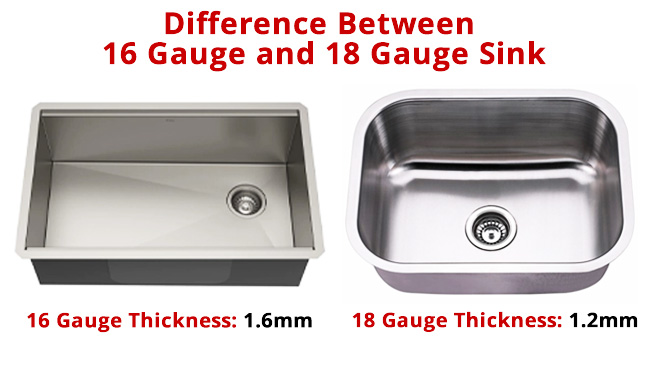
Basic Difference Between 16 Gauge and 18 Gauge Sink
| 16 gauge stainless steel kitchen sink | 18 gauge stainless steel kitchen sink |
| This is thicker | This is relatively thinner |
| Durability is high | Durability is a bit low |
| Costly | Less costly than 16 gauge sink |
What is Gauge on Stainless Steel Kitchen Sink?
The gauge indicates the thickness of the sink. It is a measurement of the thickness of the stainless steel sink. The formation of stainless steel has two significant elements. Those are chromium and nickel.
If you find 18/10 stainless steel, it means it has 18% chromium with 10% nickel. They are potent elements. Nickel strengthens the power to resist decay. The chromium prevents the iron in the steel from tarnishing.
A number indicates the gauge. Generally, from 14 gauge to 22 gauge stainless steel sinks are in use.
Now there might be a question, what does this number indicate? This number indicates the thickness. The lower the number, the thicker the steel is. So, for example, 16 gauge steel is thicker than 18 gauge steel.
Generally, thicker gauge stainless steel sinks are best for commercial use, and thinner gauge sinks are best for residential use.
Main Distinguishing Factors Between 16 and 18-Gauge Stainless Steel Sinks
The Main distinguishing factors between 16 gauge and 18 gauge stainless steel sinks are:
- Durability
- Thickness
- Industry-standard
- Soundproof
- Vibration handling capability
- Maintenance
- Cost
Let’s know them in detail;
Durability
The higher the thickness, the higher the durability. From this viewpoint, 16 gauge sinks are more durable than 18 gauge sinks. A thicker gauge ensures an almost error-free longer run of the sinks.
Even if there is rough use of the sink, 16 gauge remains unaffected. On the other hand, an 18 gauge sink gets rusted and damaged with close contact and high use of sharp utensils.
Recommended reading: Best Kitchen Sink Materials
Thickness
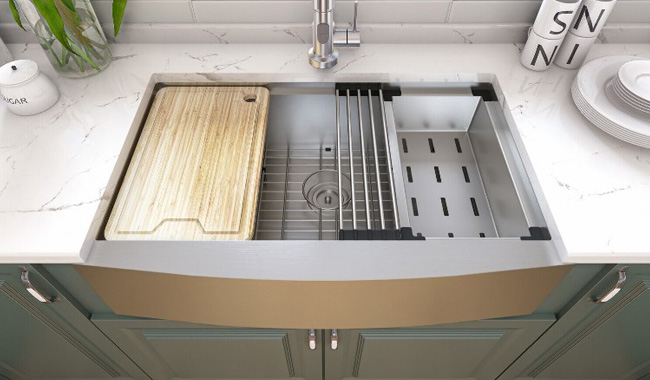
The lower the gauge number, the higher the thickness, so a 16 gauge stainless steel sink is thicker than an 18 gauge sink. Although both the sinks are a good fit for residential use, 16 gauge has more suitability for industrial or commercial use.
This is because – due to being thicker, heavy use of oversized utensils or more drops of sharp knives will not cause instant damage.
In the case of a thinner sink, there is a more substantial possibility of getting scratched & dented. A 16 gauge is equivalent to 2.52 pounds per square foot. 18 gauge weighs up to 2.016 pounds per square foot.
Industry-standard
A 16 gauge stainless steel kitchen sink is a widely accepted standard for residential purposes. But there is a good section of people who are satisfied with 18-gauge sinks too.
Therefore, for commercial use, 18 gauge is generally avoided. The industry standard for 16 gauge steel sinks is 0.0625 inches, and 0.0500 inches thickness for 18 gauge steel kitchen sinks.
[ PS. Want to know about industry-standard kitchen sink sizes, then, click here. ]
Soundproof
The higher the thickness, the greater the sound absorption capacity. So, a 16 gauge sink is more soundproof than an 18 gauge stainless steel kitchen sink.
The thickness of the 16 gauge stainless steel kitchen sink retains all the sound of pouring dishes, silverware, spoons, forks, and knives. This is not the case for an 18 gauge stainless steel kitchen sink. As it is relatively thinner, any item drops on it and makes a loud noise.
Vibration Handling Capability
Vibration handling capability comes with thickness. In the 16 gauge versus 18 gauge stainless steel kitchen sink discussion, the thinner steel will produce more noise.
The vibration handling capacity is less in an 18-gauge steel sink. On the other hand, 16 gauge being relatively thicker than 18 gauge, it can handle vibration better. As a result, there is no loud noise or sound when any utensil drops in it.
Maintenance
The 16 gauge stainless steel kitchen sink is easy to clean. It leaves no trace of dirt. For ease of cleaning, there is no scope for germination.
On the other hand, an 18 gauge steel sink requires special maintenance, as there is more chance for scratches and dents, you need to be especially careful every time you clean.
Cost
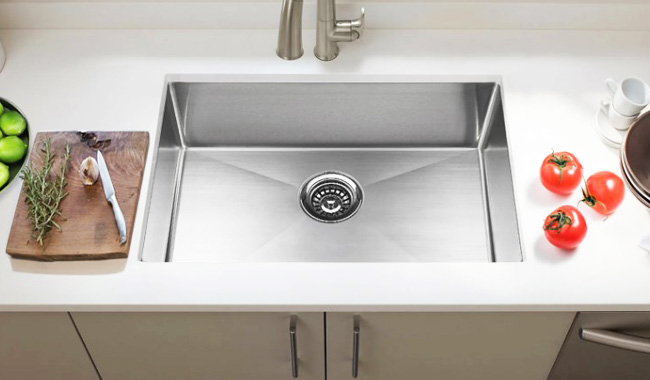
As you can see, a 16 gauge stainless steel kitchen sink offers more facilities and benefits; it has a higher price too. Because it is durable & also totally recyclable, the price is high. This is a luxury sink for many.
A good quality 16 gauge stainless steel kitchen sink may cost $500, whereas an 18 gauge kitchen sink may cost $100 without installation fees.
On a side note: Before making a decision about which kitchen sink to buy, you can read our “kitchen sink buying guide”, here. It will help you to find the best sink for your kitchen.
16 Gauge Vs. 18 Gauge Kitchen Sink- Comparison Table
| Distinguishing factors | 16 Gauge Steel Kitchen Sink | 18 Gauge Steel Kitchen Sink |
| Durability | Higher | Relatively lower |
| Thickness | Thicker | Relatively thinner |
| Industry-standard | 0.0625 inches thick | 0.0500 inches thick |
| Soundproof | Absorbs sound | Makes loud sound |
| Vibration handling capacity | High | Low |
| Maintenance | Easy | Relatively tough |
| Cost | Expensive | Relatively cheap |
16 and 18 Gauge Stainless Steel Sink – Basic Pros and Cons
This section highlights the basic pros and cons of the 16 and 18-gauge stainless steel sinks. Although the difference between the gauges is low, there are still certain differences. The pros and cons of 16 gauge stainless steel sink are listed here –
Recommended reading: Porcelain Vs. Stainless Steel Kitchen Sink
Pros and Cons of 16 Gauge Stainless Steel Sink
Pros
- Thick steel runs a longer time
- Cleaning are easy
- Less prone to damage
- Prevents denting & rusting
- Larger bowl capacity
Cons
- Expensive
- Heavyweight
Pros and Cons of 18 Gauge Stainless Steel Sink
Pros
- Less expensive
- Budget-friendly
- Lightweight
- Easy to install
- Moderately durable
Cons
- Noisy
- Prone to getting damaged
- Special care needed to use
- Not fit for commercial use
Final Verdict
The difference between 16 & 18-gauge stainless steel kitchen sinks is mainly in thickness, both are good options for home use. Still, we can differentiate.
A 16 gauge stainless steel kitchen sink sink is good if you are looking for a soundproof, durable sink with recyclability. If you are on a luxury budget, a 16 gauge steel kitchen sink is the best option for you.
An 18 gauge stainless steel kitchen sink is the best option if you are tight on budget. However, if you are not planning a long-term investment, you can choose an 18 gauge stainless steel kitchen sink.
Both the sinks are suitable for residential use, but 16 gauge steel sinks are more comfortable to use.
FAQs
- What does a 16 gauge sink mean?
16 gauge sink means a thicker, soundproof and durable kitchen sink. It is 0.0625 inches thick.
- What gauge of kitchen sink is best?
Both 16 and 18 gauge kitchen sinks are the best for residential use. People prefer 16 gauge more, though. For commercial use, 18 gauge sinks are suitable.
- Is 16 or 18 gauge thinner?
18 gauge is thinner. The higher number in the gauge indicates more thinness.
- What is the gauge of a standard stainless steel sink?
14 to 16 is a standard stainless steel sink gauge for commercial use. 16 to 18 is the ideal gauge range of a standard stainless steel sink for residential use.
- What should I look for in a kitchen sink?
Materials used in a sink, durability, thickness, noise absorption capacity, recyclability, price along with ease of maintenance are some factors to look for or consider in a kitchen sink.
All in All
So, we can say that, while you decide to purchase a stainless steel kitchen sink, a gauge is a significant issue to consider. We are often busy comparing the style, design, and price of different brands. But the quality comes with a gauge too.
Among the gauges of stainless steel kitchen sinks, 16 & 18 gauges are the most used & sought measurements for home use. Both have unique features.
So, it is essential to analyze these 16 vs. 18 gauge stainless steel kitchen sink issues thoroughly before purchasing one for a happy experience.

Differences Between Kitchen Sink and Bathroom Sink
The kitchen sink and the bathroom sink both serve as an important part of our daily routines. They are both needed for normal day-to-day activities.
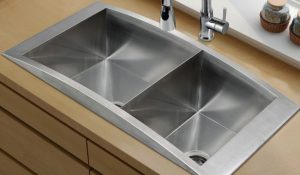
Are Stainless Steel Kitchen Sinks Out of Style?
When it comes to kitchen sinks, the choice seems to be endless. There are fireclay, porcelain, copper, stainless steel, and many more material choices. While

The 6 Main Types of Kitchen Sink Strainer for Your Kitchen
Concerning the kitchen sink strainer types or kitchen sink strainer basket types, either both are tremendously crucial for our sink drainage system. Debris is the

Undermount vs. Drop-in vs. Farmhouse Kitchen Sink
It is tough to imagine a house without a kitchen, right? Imagine you are planning to make a special meal and you have no sink
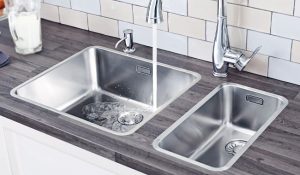
How to Choose Kitchen Sink Size | The Ultimate Guide
A well-equipped kitchen will make cooking and cleanup a lot easier. One of the first things you’ll need is a kitchen sink. That’s because it’s

Quartz vs Granite Kitchen Sinks | Details with Pros and Cons
When it comes to kitchen sinks quartz and granite are two of the most popular and robust materials used to make sinks that are long-lasting.


